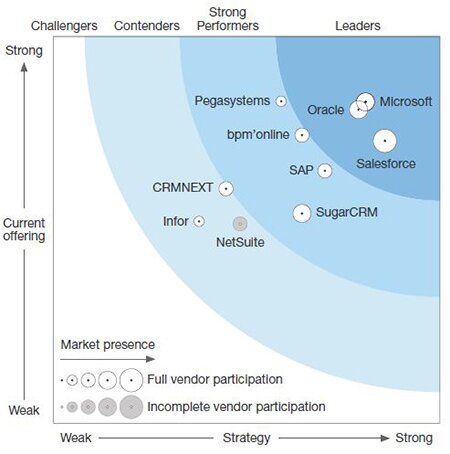Do you need a CRM?
Customer Relationship Management systems (CRMs) have a place in almost every organization that works with customers and partners. A fully featured CRM system provides benefit to just about everyone in an organization, especially those in Sales, Customer Service, and Marketing roles. Successful organizations will reach a point where they outgrow spreadsheets and simple contact management systems. They then require a fully-featured CRM that provides critical capabilities:
- Visibility into the sales pipeline
- A comprehensive view of interactions with customers and partners
- Ability to plan and execute marketing campaigns for lead generation and nurturing
State of the CRM Market
The CRM market is growing fast and still very fragmented. According to a May 2016 Gartner Study, There are four clear market leaders in the CRM space, and they still make up less than 50% of the CRM market combined. Of the four leading vendors, only Salesforce and Microsoft have consistently gained market share over the last five years.
Behind these CRM market leaders are dozens of other small vendors. Many are ERP vendors with bolt-on CRM components to help sales teams with the quoting process. Still more are free and very low-cost, no frills CRM offerings geared towards the SMB market. These other CRM vendors can meet the needs of some smaller organizations, but they often lack key features and are unable to scale as an organization grows. For a full-featured CRM solution, the choice frequently comes down to choosing between Salesforce and Microsoft Dynamics 365.

Source: Forrester Research Sales Force Automation Solutions Q2 2017
What if I Choose Salesforce?
Salesforce has been the CRM market leader for the better part of the last decade. Being the first mainstream & fully-featured cloud-based CRM solution has given Salesforce a market advantage, and they have used their success to bring a huge number of additional add-on features to market. The biggest knock against Salesforce is its cost. Their most popular Sales product retails at $150 per user/month, and their most popular Customer Service product retails at $150 per user/month. The cost to add on their Marketing product is not published. You should be able to save some money if you buy multiple product offerings. In addition to their higher base costs, Salesforce charges additional fees for mobile device access, off-line access, and workflow integration. Storage is also a big pain point for many Salesforce customers, with additional storage costs that can go all the way up to $250 per GB!
Salesforce is certainly a safe choice. It’s not going away, and their constant increase in add-on capabilities will ensure that Salesforce continues to be a market leader for the foreseeable future.
What if I Choose Microsoft Dynamics 365 for Sales?
Over the last three years, Microsoft has invested heavily in their CRM offering, Microsoft Dynamics 365 (formerly known as Microsoft Dynamics CRM Online), bringing its feature set to a level that closely matches Salesforce, but at a much lower price. Microsoft’s Dynamics 365 Enterprise Edition bundles together Sales, Customer Service, Field Service, and PowerApps for mobile devices, for a retail price of $115 per user/month. This is a dramatic difference in price when compared to Salesforce. In addition to the bundled price, Sales, Field Services, Customer Service, and Marketing can be broken out into individual apps for $95 per user/month. These Apps include mobile device access and workflow integration for no additional charge, and additional storage costs are much more reasonable at $9.99 per Gigabyte/month. Some other things Dynamics 365 has going for it:
- Office 365 integration makes it compelling for businesses already using Office 365
- The LinkedIn acquisition will certainly lead to integration with Dynamics 365 and boost its appeal
Microsoft continues to invest heavily in Dynamics 365 and will continue working hard to gain market share. Like Salesforce, it’s not going away anytime soon. It’s likely that Dynamics 365 will continue to add features at a rapid pace. For some organizations, this will be a concern, but for most, it will be welcomed.
If you are interested in learning more about Microsoft Dynamics 365, contact the DMC CRM team. We would welcome an opportunity to help you figure out if Microsoft Dynamics 365 for Sales is a good fit for your organization.
Learn more about DMC's Microsoft CRM services.